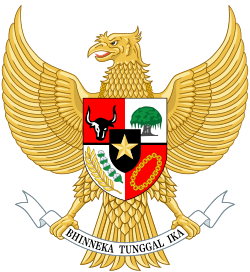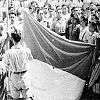Makassar Uprising
| Makassar Uprising | |||||||
|---|---|---|---|---|---|---|---|
| Part of Indonesian National Revolution | |||||||
| |||||||
| Belligerents | |||||||
|
|
| ||||||
| Commanders and leaders | |||||||
|
|
| ||||||
| Units involved | |||||||
| National Armed Forces of the United States of Indonesia (APRIS) | Royal Netherlands East Indies Army (KNIL) | ||||||
The Makassar Uprising (5–15 April 1950) was a skirmish in Makassar Sulawesi between former Royal Dutch East Indies Army soldiers under Captain Andi Aziz against the Republic of the United States of Indonesia government. The purpose of the uprising was to revolt against the incorporation of the Indonesian federated "states" into the Indonesian Republic. However, the uprising was quashed after two weeks when troops under Lieutenant Colonel Suharto and Colonel Alexander Evert Kawilarang arrived at Makassar to find light only resistance.[1]
The East Indonesian government refused to condone Aziz's actions and he was subsequently arrested in Jakarta on 14 April while attempting to negotiate with the republician authorities. The Makassar Uprising only facilitated republican control over the federal states.
Background
Andi Aziz was a former officer of Royal Dutch East Indies Army. In 1950 he was jointly an officer of both the republican Indonesian National Armed Forces (ABRI) and the armed forces of the federal Republic of the United States of Indonesia (APRIS). His commissioning was witnessed by Lieutenant Colonel Ahmad Yunus Mokoginta, the commander of the Territory Army of the State of East Indonesia, one of the federated states of the Republic of the United States of Indonesia.
On 5 April 1950 Aziz moved his troops to attack the headquarters of APRIS in Makassar and held some APRIS officers hostage, including Lieutenant Colonel Mokoginta. Dominating Makassar, he declared that the State of East Indonesia must be defended. He demanded that the APRIS officers should be held responsible for security disturbances in the State of East Indonesia region, which he claimed was orchestrated by the republican government.
On 8 April 1950 the Indonesian government issued an ultimatum requesting Aziz's presence in Jakarta. If Aziz were to ignore the ultimatum, the Indonesian Navy ship "Hang Tuah" would bombard Makassar. This ultimatum was ignored. After the deadline had passed the government sent troops under the command of Colonel Alex Kawilarang and on 15 April Aziz acceded to the government's demand of reporting to Jakarta after obtaining an agreement from Hamengkubuwana IX that he would not be arrested. However, he was disowned and arrested immediately upon his arrival in Jakarta.
Aftermath
After a military showdown between APRI and ABRIS on 5 August 1950, the Republic of Indonesia formally dissolved the Republic of the United States of Indonesia and absorbed the federal states into the republic on 17 August.
Bibliography
- Kahin, George McTurnan (1952). Nationalism and Revolution in Indonesia. Ithaca, N.Y.: Cornell University Press. ISBN 0-87727-734-6.
- Palmer, Leslie H. (1962). Indonesia and the Dutch. London: Oxford University Press.
- Westerling, Raymond Paul Pierre (1952). Mes aventures en Indonesie (in French). – translated from the French to English by Waverley Root as – Challenge to terror. London: W. Kimber.
References
- ↑ Clancy, Gregory Bruce (1992). A Dictionary of Indonesian History Since 1900. Sydney, Australia: Sunda Publications. p. 18.



